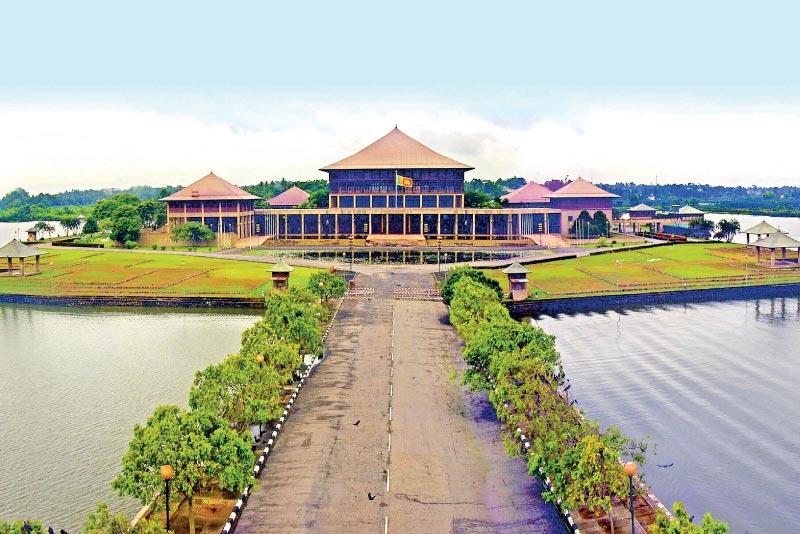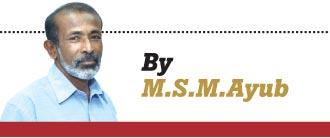02 Dec 2023 - {{hitsCtrl.values.hits}}

 A Fundamental Rights Petition has been filed on Tuesday before the Supreme Court seeking an order suspending the implementation of a decision taken by the Constitutional Council (CC) calling for a report from the Chief Justice regarding certain Judges of the Court of Appeal.
A Fundamental Rights Petition has been filed on Tuesday before the Supreme Court seeking an order suspending the implementation of a decision taken by the Constitutional Council (CC) calling for a report from the Chief Justice regarding certain Judges of the Court of Appeal.
The petition alleged that the CC had taken this decision in the context of those Judges being nominated by the President for appointment to the Supreme Court and different positions of the Court of Appeal.
Earlier, on November 20 the Daily Mirror also reported that Speaker Mahinda Yapa Abeywardena in his capacity as the Chairman of the CC had written to Chief Justice Jayantha Jayasuriya asking for details of judges of the two apex courts.
The Speaker has stated in that letter that the CC considered its mandate to approve the President’s recommendations for the Appointment of Judges as a matter of great responsibility and was of the view that it needed necessary information to carry out its duty in an effective and efficient manner.
The petition against the CC comes against a backdrop of President Ranil Wickremesinghe’s scathing attack on the CC in Parliament on November 23 where he had attributed the absence of an IGP and new Judges in the country, to the Constitutional Council and its members, while accusing certain members of the Constitutional Council of sabotage.
In the same breath, he announced his decision to appoint a Parliamentary Select Committee (PSC) to investigate issues about the CC.
He stated that the Speaker as the Chairman of the CC had informed him in writing that the CC was unable to decide on the appointment of Judge Nissanka Bandula Karunaratne to the Supreme Court with three members of the CC in favour and three others opposed while two remaining members had abstained, causing a delay in the appointment.
Besides, the slot allocated to the minor parties in the CC is also vacant. Apart from this division at the CC meeting on November 20, the President’s statement was made in the context of the CC’s refusal in October and November to approve his two recommendations to grant third and fourth service extensions, both three weeks each, to former Inspector General of Police (IGP) C.D. Wickramaratne.
Hence, the petition against the CC reminds us of the Writ Petition filed by retired Army Colonel W.M.R. Wijesundera on January 2 this year in the Supreme Court against the move by the Elections Commission (EC) to hold Local Government elections, while the President and the Government were making several efforts to postpone those elections.
The government was successful in that, with the hearing of the petition being repeatedly deferred thereby elections were also repeatedly put off.
On both occasions cases were filed while the President was at odds with the respondent institution – the EC and the CC.
The case regarding the petition against the CC would be interesting and unique, as this is the first time a decision taken by the CC has been challenged in a court since it was first introduced through the 17th Amendment to the Constitution in 2001. (It was reintroduced through the 19th and the 21st Amendments as it was abolished by the 18th and 20th Amendments.)
Although the CC has legal immunity, it can be challenged by way of a Fundamental Rights violation petition, according to the Constitution.
However, the President’s argument about the delay in the approval by the CC for his recommendations on the appointment of Judges to the apex courts has strong ground, as the Chairman of the CC had informed him that the CC was unable to decide on the appointment of Justice Nissanka Bandula Karunaratne to the Supreme Court.
If that were the case, how long should the President wait for its approval? The Constitution provides for the CC to take decisions unanimously or with at least five members “present at such meeting” supporting it.
Referring to the vacant seat in the CC during his statement to the Parliament, the President accused the Opposition parties of not nominating a member as the minor parties’ representative.
However, replying to this allegation Samagi Jana Balawegaya MP Dr Harsha de Silva said TNA member Dharmalingam Siddharthan’s name had been sent weeks ago but the Speaker had not made the appointment.
Although there were media reports that two groups in the Opposition were vying for this minor party slot, nobody challenged Dr Silva’s claim, effectively putting the ball in the Speaker’s court. Dr Silva’s statement, despite having pointed a finger at the Speaker, was not denied by the latter either.
However, failure to appoint a new IGP after the end of the tenure of the former IGP Chandana Wickramaratne had nothing to do with any commission or omission by the CC.
Had the President nominated a qualified person as the new IGP once Wickramaratne reached his retirement age in March (without seeking service extensions for him) the CC, which approved those extensions twice, would not have had any reason to reject the nomination. Besides, when the President sought approval for his recommendation for the second three-month extension for Wickramaratne, the CC had requested that a new IGP be appointed as further extension couldn’t be given.
The purported decision to appoint a PSC to investigate issues pertaining to the CC would be an interesting development if implemented.
Considering his suggestions in the recent past on appointing PSCs on various issues including the fire on the X-Press Pearl ship in 2021, President Wickremesinghe seems to believe that PSC is a panacea.
However, Speaker Abeywardena might have been worried about the decision not because of the possibility of any PSC investigation finding the CC headed by him at fault, but because it amounts to a probe into an entity headed by him by another entity under his purview.
The Constitutional Council and the so-called Independent Commissions were introduced first by the “Pariwasa” (Probationary) Government under President Chandrika Kumaratunge in 2001, amidst heavy pressure by the Janatha Vimukthi Peramuna (JVP) that had bailed out her government which had lost the majority in Parliament at that time.
Those independent bodies were meant to clip some degree of the executive powers of the President. However, with the passage of time, the Executive has found ways and means to circumvent the mechanism.
For instance, President Mahinda Rajapaksa appointed Judges to the Higher Courts bypassing the CC during his first tenure. With Gotabaya Rajapaksa being voted into power in 2019, the Police Commission gave in to his wishes and removed Shani Abeysekara from the post of CID Director.
The Elections Commission was compelled this year to postpone Local Government elections indefinitely when President Ranil Wickremesinghe used his executive powers to withhold funds allocated for those elections.
And the Speaker stated recently in Parliament that both the CC and the President were correct when President Wickremesinghe granted service extensions to IGP Chandana Wickramaratne, ignoring the refusal by the CC to approve those extensions. The only thing they needed was just to cast aside morality.
25 Nov 2024 1 hours ago
25 Nov 2024 2 hours ago
25 Nov 2024 2 hours ago
25 Nov 2024 2 hours ago
25 Nov 2024 3 hours ago